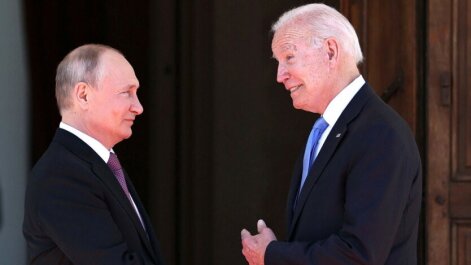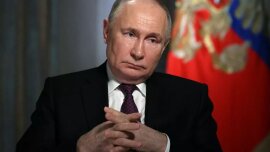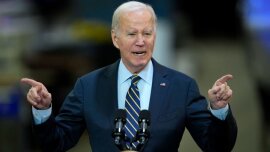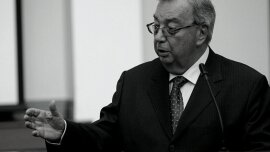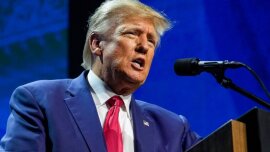It is the second talk between Joseph Biden and Vladimir Putin this year. It was a logical continuation of the so-called "strategic dialogue" initiated by Biden in June during a face-to-face summit with Putin in Geneva after the April military-political escalation around Ukraine.
Now the situation seems to have repeated itself. The talks between the two presidents were preceded by a powerful informational warm-up around the topic of pulling Russian troops to the borders of Ukraine and the probable military invasion of Russia with detailed descriptions of combat scenarios and the layout of maps in which directions this attack would be carried out.
For a whole month, the American press and administration officials escalated the situation, reporting on the movements of the Russian army along the borders with Ukraine and Belarus, and the Ukrainian authorities, who first denied this information, then also joined the game. For its part, Russia stubbornly denied all accusations and the existence of any military plans for an invasion, playing the role of a peacekeeper and a constructive interlocutor.
It must be said that the parties did everything to “sterilize” the media space around the negotiations as much as possible: the presence of the press was strictly limited, comments in the media were given rarely and reluctantly, and they decided to abandon the presidential statements in favor of a drier and less detailed press release on the site. Judging by the published photos from the meeting, not even all members of the "inner circle" of the presidents participated in the negotiations.
I think this was due to the desire of the parties to protect themselves from the "leaks" of information to the press, this is especially true for the United States, where this has long been an extremely frequent occurrence after Donald Trump.
Russian President Vladimir Putin sat alone at the meeting. Joseph Biden was in the presence of four members of his team, including US Secretary of State Anthony Blinken. The two presidents communicated through the interpreters in the other rooms, via a secure video link. This channel was created back in the days of Trump to maintain bilateral contacts, and now Biden has used it for the first time. The Putin-Biden talks lasted just over 2 hours. During the meeting, Biden expressed the hope that they will meet again, but already live during the G20 summit in 2022 in Indonesia.
As a result of the talks, Russia and the United States published final statements. The White House press release provided very little information. They only mentioned that President Biden "expressed deep concern about the escalation of the situation by Russian troops near the borders of Ukraine" and "made it clear that the United States and our allies will take strong economic and other measures in the event of a military escalation." It was also reported there that the two presidents agreed to continue communication, and discussed issues related to strategic stability, cyber threats and regional problems, "such as Iran ."
More details about the negotiations were told already in Biden's entourage after the summit. At a press conference in the White House, Presidential Assistant for National Security Jake Sullivan repeated everything written in a short press release, adding that Biden had promised to increase arms supplies to Ukraine in the event of an escalation and to impose new sanctions against Russia. But at the same time, Sullivan noted that Biden "showed another path: de-escalation and diplomacy, " saying that "the United States and our European allies will begin consultations on broader long-term topics, including our strategic problems with Russia and those strategic issues that concern Russia", while making a reference to the times of the Cold War, when" we managed to do this and develop mechanisms to reduce instability and increase transparency in relations."
Answering journalists' questions, Sullivan was already less specific and tried to get away from some sensitive topics. In particular, in response to a question about whether the United States is considering sending troops to Ukraine in response to a new Russian invasion, he replied that the United States is ready to strengthen the "eastern flank of NATO ", namely: Poland, Romania and the Baltic countries.
On the sanctions, he did not want to answer specifically, mentioning only that "experts from the Treasury and the State Department" are working on their preparation if something happens. " And answering the question "Why wait for an invasion and not impose sanctions now?" Sullivan said the US should develop "an alternative path through which we can make progress in diplomacy on the Donbas, through the Minsk Agreements and the Normandy Format, " and through which we can tackle NATO and us concerns and security issues with which Russia is concerned ”.
The tone was somewhat more optimistic in the Kremlin's statement . They emphasized the "businesslike and frank" nature of the conversation. They recalled the "alliance of the two countries during the Second World War" as "an example for building contacts and working together in today's realities" (that is, they perceive the current period as a military one), retold a small dispute between the two leaders about Ukraine and the movements of Russian troops near the Ukrainian borders, announced the beginning of some "substantive consultations" on "sensitive issues" (Ukraine and NATO), and also recalled the possibilities of cooperation in cyber security and nuclear negotiations with Iran.
At a press conference with the Greek Prime Minister the next day , Vladimir Putin added on his own that he and Biden talked about regional issues, the conflict with Ukraine and NATO's eastward expansion at the expense of Ukraine, while emphasizing that the latter is the most sensitive and priority for Moscow "for the medium and even strategic perspective." According to Putin, the parties agreed "to create an appropriate structure that will deal with this substantively, in detail and submit appropriate proposals."
If we discard all formal ritual phrases and general declarative statements, I would draw several important conclusions from the results of the Putin-Biden summit:
- The United States and its European allies are ready for a pragmatic dialogue with Russia, but so far they cannot guarantee anything for ideological reasons. This year has shown us not only the growing “tiredness” of the Ukrainian issue in Western political circles, but also the willingness of the United States and the European Union to talk with the Russian Federation on fundamental issues of international politics. Of course, the West of Russia cannot provide any guarantees, especially legal ones a la "Yalta-2," negotiations. In particular, the United States actually confirmed that it is ready to discuss with the Russian Federation the issue of a new security architecture in Europe, in which Russia could have some role and function of its own, obviously in exchange for Russian cooperation in the global confrontation with China and stabilization of othercrisis sites important for the West (nuclear negotiations with Iran, Syria, Libya, the Arctic, etc.). In a sense, the dramatic changes in the rhetoric and behavior of the Russian Federation in 2015-2016 gives some results, and the Russian elites manage to convince at least some of the Western political circles that they can be useful for them as a situational partner in the field of security rather than as an enemy in the orbit of China and in alliance with other "unreliable troublemakers" such as Turkey, Iran, Venezuela, North Korea, Pakistan.
- The question of Ukraine's joining NATO is closed for the next 5-10 years. Starting with Anthony Blinken's visit to Kyiv in May this year and ending with V. Zelensky's visit to Washington on September 1 , we were consistently and almost openly told that the issue of Ukraine's accession to NATO was blocked and would not be resolved in the near future. Not only because of the unpreparedness of some of the American elites, but also because of the position of the US European allies, primarily Germany and France, which are not ready to accept Ukraine into the Alliance for a number of reasons, and one of them is the threat of direct confrontation with the Russian Federation. As a result of the Putin-Biden talks, the parties agreed to create a "special structure" that will deal with the discussion of NATO's non-expansion to the east with the participation of the Russian Federation and the United States, but not Ukraine. This means that Putin managed to convince Biden at least to postpone the NATO issue, and at the maximum to freeze its expansion.
- They will try to persuade Ukraine to implement the Minsk agreements as soon as possible. As a result of the negotiations, the United States remained committed to the idea of implementing the Minsk agreements as the main non-military, diplomatic option for resolving the conflict between Ukraine and Russia. This opens up an opportunity for the Russian Federation to continue convincing its Western partners that there is no alternative to this format and the need to jointly force Kyiv to comply with the agreements. The lack of alternatives and other peaceful initiatives, including from Ukraine, only strengthens the negotiating positions of the Russian Federation insisting that only Minsk-2 is the path to a peaceful and early settlement of the conflict on a diplomatic basis, which has become one of the pillars of its foreign policy.
- The Putin-Biden "Strategic Dialogue" is working. As the last 6 months have shown, Russia and the United States can cooperate point-wise and situationally on a number of issues, despite the remaining mutual distrust, suspicion and antagonism in their relationship. This is not to say that they have made significant progress, but judging by the after-effects of the summit, both sides are pleased with the result and with the way the "ordering confrontation" (as Biden called this process) is developing.
- The agenda of American-Russian relations is much broader than we think. Although the summit was largely devoted to Ukraine and NATO, other issues were also discussed, and they are often omitted in the Ukrainian media space, which is why we do not always see a broader framework of American-Russian interaction. In addition to Ukraine, the interests of the United States and Russia overlap in Belarus, Moldova, the South Caucasus, Central Asia, Syria, Libya, the Eastern Mediterranean, the Black Sea, the Arctic, as well as in the areas of cyber security, nuclear non-proliferation and strategic stability. Do not underestimate these areas, since the foreign policy of the Russian Federation is very different for each of them, and it was thanks to Moscow's “flank diplomacy” that they managed to reverse the negative trend for themselves in 2014-2015.
- The set of "punitive measures" against the Russian Federation in the event of further escalation against Ukraine in the West has remained limited and unchanged since 2014. In response to one of the key questions "What will the United States do in the event of a further military escalation of Russia against Ukraine?" we received a response that was not much different from the statements made by Washington in 2014-2015. The United States is ready to react, but this reaction will be limited and not fatal for Russia, and this must be understood in Ukraine, where stakes are still being made on some magical sanctions or military assistance, which, judging by the statements, should not be expected. As a response to the escalation, the United States is ready to impose increased sanctions against the Russian Federation, send reinforcements to the Baltic countries, Poland and Romania, as well as increase the supply of weapons to Ukraine beyond what they already supply. All this means that Ukraine cannot count on the fact that the punitive measures of the West in the event of another military invasion of the Russian Federation will become critical for Moscow or stop the war.
Unfortunately, the Ukrainian authorities are still unable to respond to the challenges that have generated changes in international politics, and in particular this virtual summit.
First of all, we are talking about the crisis of our foreign policy after 2014. I think after this summit it is safe to say that our policy based on belief in "draconian sanctions", a united anti-Russian front and an early entry into NATO as the main factor deterring Russia is no longer relevant. The NATO issue will be paused for the near future.
There has been no united anti-Russian front for a long time, especially as the global rivalry between the United States and China intensifies, in the context of which Russia acquires a different role and fades into the background.
And the "draconian sanctions", even if they are introduced, are unlikely to become so critical for the Russian economy that they would force Moscow to abandon Crimea, leave Donbas and simply surrender to the West, especially given the experience of sanctions pressure in other countries, which did not always change its status-quo, and sometimes even worsened the position of external players. In addition, even the restrictions against the Russian national debt, which Senator Brad Sherman has been constantly lobbying since 2019, not only will not create insurmountable problems for Russia, but are also perceived in the United States itself as ineffective and not the best at this stage.
Another problem for us is the Minsk agreements . Judging by the statements of J. Sullivan and the "leaks" of information through the Associated Press , the United States decided to try to find a compromise with Russia on Ukraine, starting from the long-suffering Minsk agreements. In particular, this means that Ukraine will be persuaded to implement (fully or partially) Minsk-2, which contradicts the general attitude and policy of the Ukrainian authorities this year, which launched a campaign of criticism of the agreements, urging them to find an alternative. So far, no alternative is foreseen, and in its numerous statements the West continues to consider the Minsk agreements as the only basis for resolving the conflict.
Attempts to push through Minsk in Ukraine will inevitably lead to an increase in protest moods and a conflict between the authorities and a part of society that opposes a compromise and perceives the agreement as surrender and defeat. And this already creates a political threat for Vladimir Zelenskнy himself and his team.
Finally, the marginalization of our international positions is becoming increasingly evident. This is a long-term threat, less obvious, but no less dangerous from that. It depends not only on Russia. This is the story of the stagnation of our foreign policy for all 30 years, associated with both the conflict with Russia and the ineffectiveness of the public administration system and the inability to formulate our own agenda and impose it on partners.
The virtual Putin-Biden summit in this context only confirms this trend: Ukraine is weakening in the international arena, falling out of the global agenda and thus becoming the subject of negotiations of major players such as the United States and Russia.
Therefore, when people in Ukraine are outraged by the "negotiations on Ukraine without Ukraine", one must understand that this is happening not only because the mean global behind-the-scenes wanted it so, but also because of our own weakness, sluggishness and inertia. Ukraine turned out to be unprepared for changes in world politics, in particular for a change in US foreign policy, which we warned about in January this year .
In my opinion, our political leaders must finally acknowledge the existence of an acute crisis in foreign policy and develop new approaches to interacting with the surrounding eco-system. The way out may be the rejection of the political fetishes of 2014-2015, the recognition that the path to NATO and the EU will be long and difficult, and pragmatism in foreign policy decisions and in the search for alternative partners that can help solve some of our strategic tasks that cannot be solved by the western allies.
We don't have much time left. My colleague Igor Tyshkevich and me, 3 years ago, wrote about the likelihood of various kinds of agreements between the West and the Russian Federation (which are collectively often called a “big deal”). The Putin-Biden summit did not demonstrate these very agreements (and therefore, the anger about "we are being drained" is premature and erroneous), but it showed that the Western countries, and the United States in particular, are ready for such a conversation and may come to some kind of agreement, not even legally guaranteed.
Of course, based on our current foreign policy positions, our interests in such agreements will not be fully and not always taken into account in the way we want them to. To prevent this, Ukraine needs to take a more active position both on the issue of resolving our conflict in Donbas and on our functionality in the region and the world.
